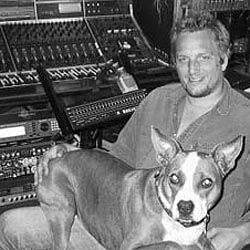These words can raise the hairs on the back of a purist’s neck, but if it rocks, it rocks! Jason Carmer’s work on Third Eye Blind’s back-to-back, multi-platinum smashes (their eponymous debut and “Blue,” their follow-up album), and a Grammy-nominated release for Los Amigos Invisibles, have got the purists taking notes on some of Carmer’s techniques.
John Carmer (Jason’s dad) was a musician in New York City. As a result, Jason spent his early childhood in the Big Apple.
In 1967, everything changed. Elektra offered John Carmer a development deal and the Carmers moved to California to give it a shot.
At that time, Carmer was completely surrounded by music. He recalls “they were playing all the time.”
“I would wake up and hear my dad’s band playing. I’d be trying to sleep, and hearing my dad’s band playing.”
Unfortunately, the practice and the development deal didn’t lead to a record deal and John Carmer left the band.
Carmer’s parents split up, but the remaining members of the band stuck it out and became classic rockers Blue Oyster Cult. “Sometimes, I still can’t believe that he quit that band!” Carmer muses.
Carmer picked up guitar at age 8. By age 10, he was into punk rock. By age 15, he was “really into punk rock!” Carmer moved to DC with his mother when his parents separated.
Carmer played in a hardcore band called Double O. He recalls “our second gig, we were playing with the Dead Kennedys in front of 2000 people.” He also played in a seminal punk rock outfit known as the Meatmen.
A buddy of Carmer’s let him borrow “Raw Power”, by Iggy Pop. “My buddy said the record was the essence of everything punk rock. I listened to it and I thought it was horrible because it was so raw. Two days later I realized it was incredible because it was so raw!”
Iggy Pop’s unapologetic rawness inspired Carmer to get into the studio, but ultimately, it was the combination of the rush of performing in groups and being in the studio that led Carmer to decide to be an engineer.
He says “the whole do-it-yourself, punk attitude made me do it.” Carmer took this decision seriously, and started taking classes at the College of Recording Arts. He later dropped out.
“I know Ohm’s law and all that stuff; I learned all the basics at that school. I learned how to align a tape machine. I learned the differences between the patterns on microphones.”
After leaving the College of Recording Arts, Carmer started doing live sound and landed a tour with Consolidated, a hard hitting, take no prisoners, Bay Area rock band. On that tour he met Philip Steir, drummer and future co-owner of TOAST.
After touring with Consolidated, Carmer realized that doing live sound wasn’t the right fit for him. “It’s so loud!” he says. “Also, the touring thing is hard. I’m married. I’m into being domestic. Plus, I like to be involved in the creative process.”
“Live sound engineering is mostly reinforcing the sound that’s being created, whereas in the studio you’re building it from the ground up.”















